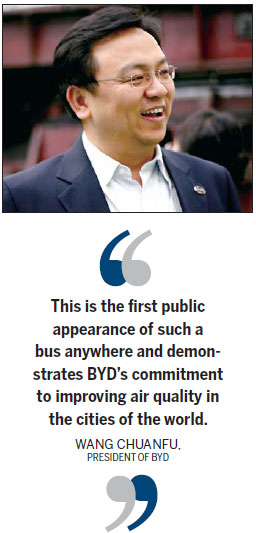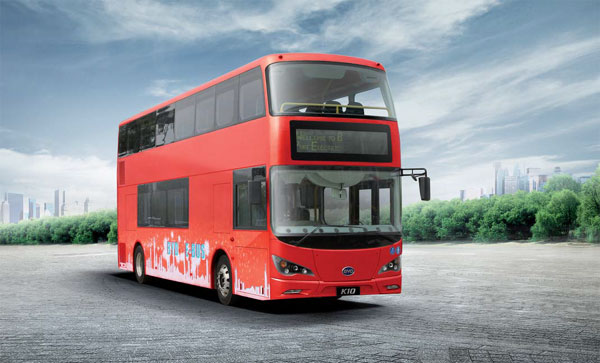Iconic red bus that's green puts company in fast lane
Updated: 2015-10-16 08:15
By Fu Jing(China Daily Europe)
|
|||||||||||
|
The electric double-deck bus designed for London by Chinese carmaker BYD will be on display at Lancaster House in London on Oct 21. Photos Provided to China Daily |
Xi's visit offers perfect opportunity for unveiling public transport of the future
President Xi Jinping has been a strong advocate of an automotive industry in China that invests great effort and a lot of money in developing new-energy vehicles.
So it seems fitting that the Chinese carmaker BYD, a global leader in new-energy vehicles, is using Xi's coming visit to Britain as a backdrop as it unveils one of its great successes.
Wang Chuanfu, president of BYD, whose headquarters is in Shenzhen, says that the world's first pure electric double-deck bus, which has been designed for London, will be on display at Lancaster House in the capital on Oct 21 and that his company will enter into a partnership with a British bus manufacturer.
"This is the first public appearance of such a bus anywhere and demonstrates BYD's commitment to improving air quality in the cities of the world," says Wang, also an adviser on China's Five-Year Plan (2016-2020), in an interview with China Daily.
Xi, after his state visit to Britain from Oct 20 to 23, is due to hold talks with other top decision-makers at a plenary session of the Communist Party of China Central Committee.
Wang says BYD, which boasts of annual turnover of almost 9 billion euros ($10.2 billion) and having Warren Buffet as a shareholder, is ushering in a new generation of the famous London red buses. They have been designed to meet London's special requirements and retain their instantly recognizable cultural identity, he says.
"BYD is showcasing the world's first zero-emission double-decker bus. Five of them will be running on the city's streets before the end of the year."
Wang says the partnership his company is entering into is with Britain's largest bus maker, Alexander Dennis Ltd, to produce a single-decker new-energy bus.
"This will cover the joint production of all-electric buses, with BYD providing its world-leading electric battery technology and ADL its acclaimed bodybuilding expertise," Wang says.
Previously, BYD had won an order for 51 units for Transport for London, the biggest 12-meter fully electric single-decker tender in the European Union, which breaks the record set by the 35 units ordered by Amsterdam Schiphol Airport.

The buses will be a combination of BYD chassis and all electric powertrain combined with bodies and final assembly by ADL at its plant in Falkirk, Scotland.
BYD's dealings with British businesses point to a new trend in China's going-out strategy, he says.
"The partnership demonstrates that the world-leading new-energy vehicle technology from China is being accepted by developed countries."
It is 10 years since a Chinese president last visited Britain - Hu Jintao in early November, 2005 - and Xi's visit is all the more important given that China's economy is in transformation and becoming stronger. Chinese-British exchanges will provide enormous opportunities for the two countries to work more closely together.
"I think we will see some surprises in the way Xi's visit builds on the Chinese-British relationship and promotes Chinese-British trade collaboration," Wang says.
"It will also bring more opportunities and policies to encourage Chinese entities already in Britain."
BYD set up its European headquarters in the Dutch port of Rotterdam in 1999. Since then it has gained a solid reputation across Europe because of its environmentally friendly buses.
It now has a presence in 26 European countries, focusing on three business-to-business sectors: forklift trucks, taxis and, most importantly, its buses. All three vehicle types rely on BYD's emissions-free battery technology.
As with other Chinese brands when they first enter the European market, Wang says, BYD faced widespread distrust simply because it was Chinese, almost no brand recognition and a lack of operational experience in Europe.
Today's Top News
Royal family to gather in strength for Xi
Xi's trip to herald 'golden decade' for relations
Wanda's Wang again becomes richest Chinese
Ex-NBA star Odom reported critical, Kardashian at his side
Country house to add English tradition to Xi, Cameron meeting
Most Chinese cities failing air quality standards: Report
Xi to initiate 'golden era' in China-UK ties
China's September inflation cooler than expected
Hot Topics
Lunar probe , China growth forecasts, Emission rules get tougher, China seen through 'colored lens', International board,
Editor's Picks

|

|

|

|

|

|







